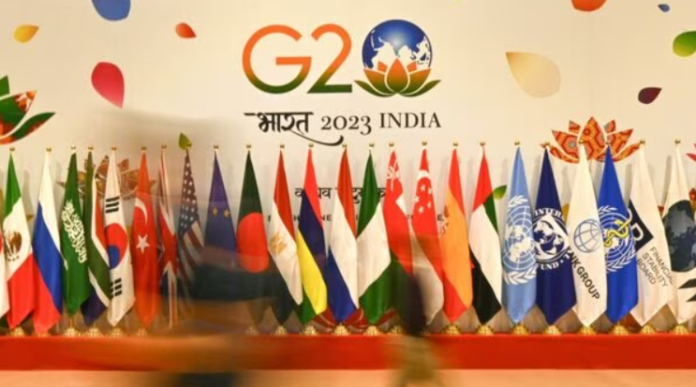G20 leaders issued a declaration on the New Delhi summit outcome, the European Parliament reports.
The leaders met at the 18th G20 Summit, the largest forum for international economic co-operation, in New Delhi. India, as host and chair, announced six priorities: green development, inclusive growth, progress on the UN SDGs, technological transformation, multilateral institutions for the 21st century, and women-led development.
Countries committed to fulfil the goals of a broad 83-paragraph declaration under the theme of “One Earth. One Family. One Future.” According to the declaration, countries will accelerate the implementation of the 2030 Agenda for Sustainable Development and triple renewable energy capacity globally by 2030.
Some of the deliverables were to:
- accelerate the full and effective implementation of the 2030 Agenda for Sustainable Development;
- take action on the agreement to triple renewable energy capacity globally by 2030;
- reduce greenhouse gas emissions and carbon dioxide emissions;
- increase funding from all sources and accelerate efforts to reach the Paris Agreement, including its temperature target;
- to improve access to digital services and digital public infrastructure, as well as to use the opportunities of digital transformation to stimulate sustainable and inclusive growth;
- close the gender gap and promote the full, equal, effective and meaningful participation of women in the economy as decision makers;
- Call for reform of the international development finance system, including more effective multilateral development banks (MDBs);
- Commit to creating a rules-based, non-discriminatory, fair, open, inclusive, equitable, sustainable and transparent multilateral trading system based on the World Trade Organisation.
The absence of Chinese President Xi Jinping has attracted considerable media attention. Some analysts attribute his non-attendance to strained relations with India, whereas others suggest that China is disappointed with the “pro-American” nature of the summit.
Compared to last year’s communiqué, the G20 Leaders’ Declaration in New Delhi was softened. This year’s text does not condemn Russia outright, but states that all countries should “refrain from acting against the territorial integrity and sovereignty or political independence of any state.”
They also called for initiatives such as the Black Sea Grain Initiative to ensure immediate and unimpeded grain supplies.
As last year, Russian President Vladimir Putin did not attend the summit. He was represented by Foreign Minister Sergey Lavrov. The latter called the summit a success and said that thanks to the “consolidated position of the Global South in defending its legitimate interests” it was possible to “prevent the success of the West’s attempt to once again ‘Ukrainianise’ the entire agenda.”
Ukraine criticised the final G20 declaration, but thanked its allies for contributing to promoting Ukraine’s position. Ukrainian President Volodymyr Zelensky, who took part in the 2022 summit via video conference, was not invited to the meeting this time.
The key developing economies of the Global South (India, Brazil, Indonesia and South Africa) reportedly played a crucial role in negotiating a compromise that allowed all G20 members to sign the final declaration, despite fears of a polarised world.
The decision by G20 leaders to grant permanent membership status to the African Union (which represents 55 African member states) recognises the growing role of developing countries in the Global South.
Several side events took place on the margins of the summit. US President Joe Biden and Indian Prime Minister Narendra Modi jointly hosted a group of G20 leaders. The meeting aimed to accelerate investment in scaling up high-quality infrastructure projects and developing economic corridors under the Partnership for Global Infrastructure and Investment (PGII).
A memorandum of understanding on the India-Middle East-Europe Economic Corridor (IMEC), seen as a possible alternative to China’s Belt and Road Initiative, has been signed by the US, India, Saudi Arabia, the United Arab Emirates, France, Germany, Italy and the European Union.
The EU and the US have also decided to promote jointly the Trans-Africa Corridor. It links southern Democratic Republic of Congo and north-western Zambia to regional and global trade markets through the Port of Lobito in Angola.
Some experts emphasise that India has effectively used the G20 presidency as an opportunity to assert itself as the voice of the Global South, particularly by choosing topics relevant to developing countries and proposing to invite the African Union to become a permanent member of the G20.
Environmental experts are critical of the G20 summit on the issue of commitments on climate change. For example, for Greenpeace, the result was disappointing, partly because the leaders failed to come to an agreement on phasing out fossil fuels.
India will host the Speakers of Parliaments of the G20 countries (including the European Parliament) from 12 to 14 October 2023 at the new Parliament building in New Delhi.
The next two G20 presidencies will also belong to members of the BRICS group, with Brazil officially assuming the annual G20 presidency on 1 December and South Africa a year later.
Brazilian President Luiz Inácio Lula da Silva announced at the closing of the G20 Summit that the Brazilian G20 Presidency would have three priorities: social inclusion and the fight against hunger; energy transition; and reform of global governance institutions.
